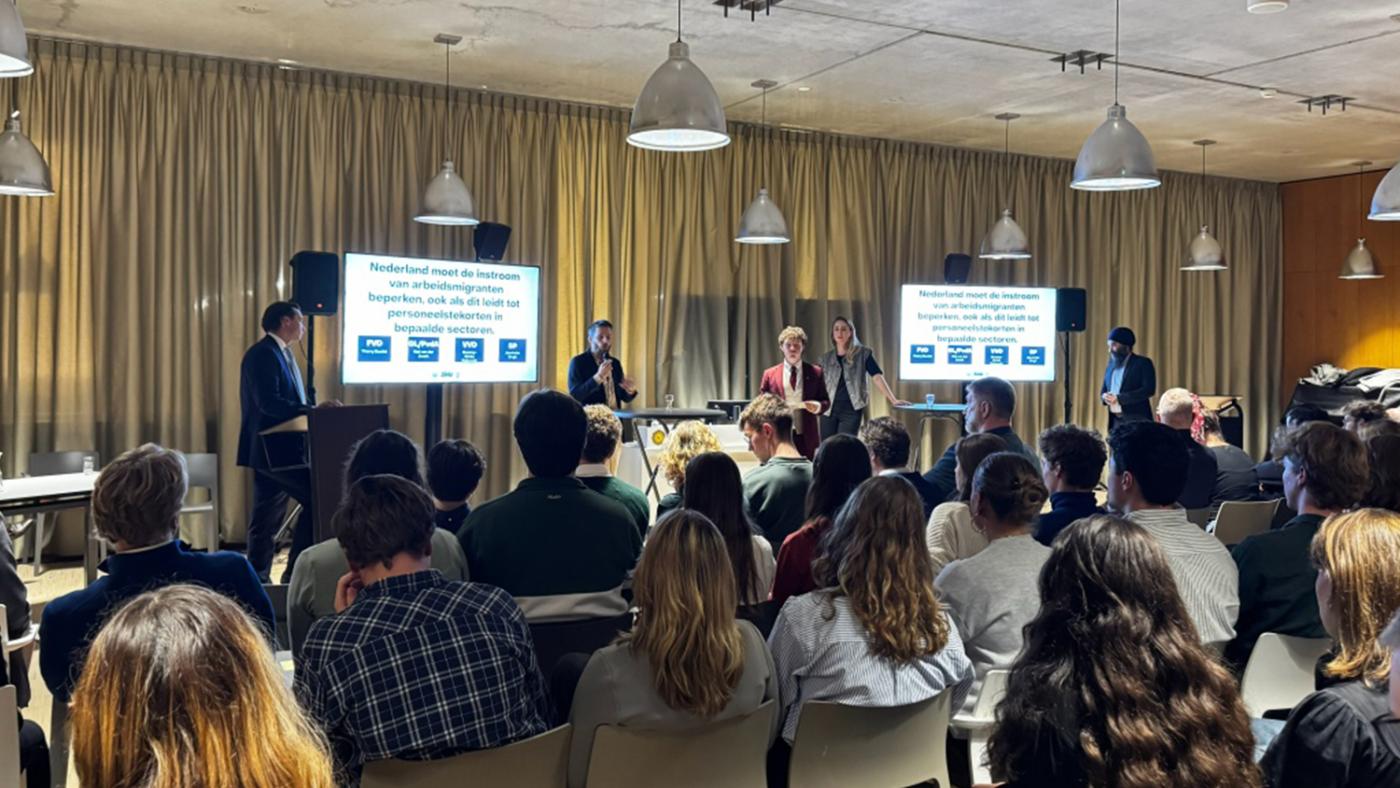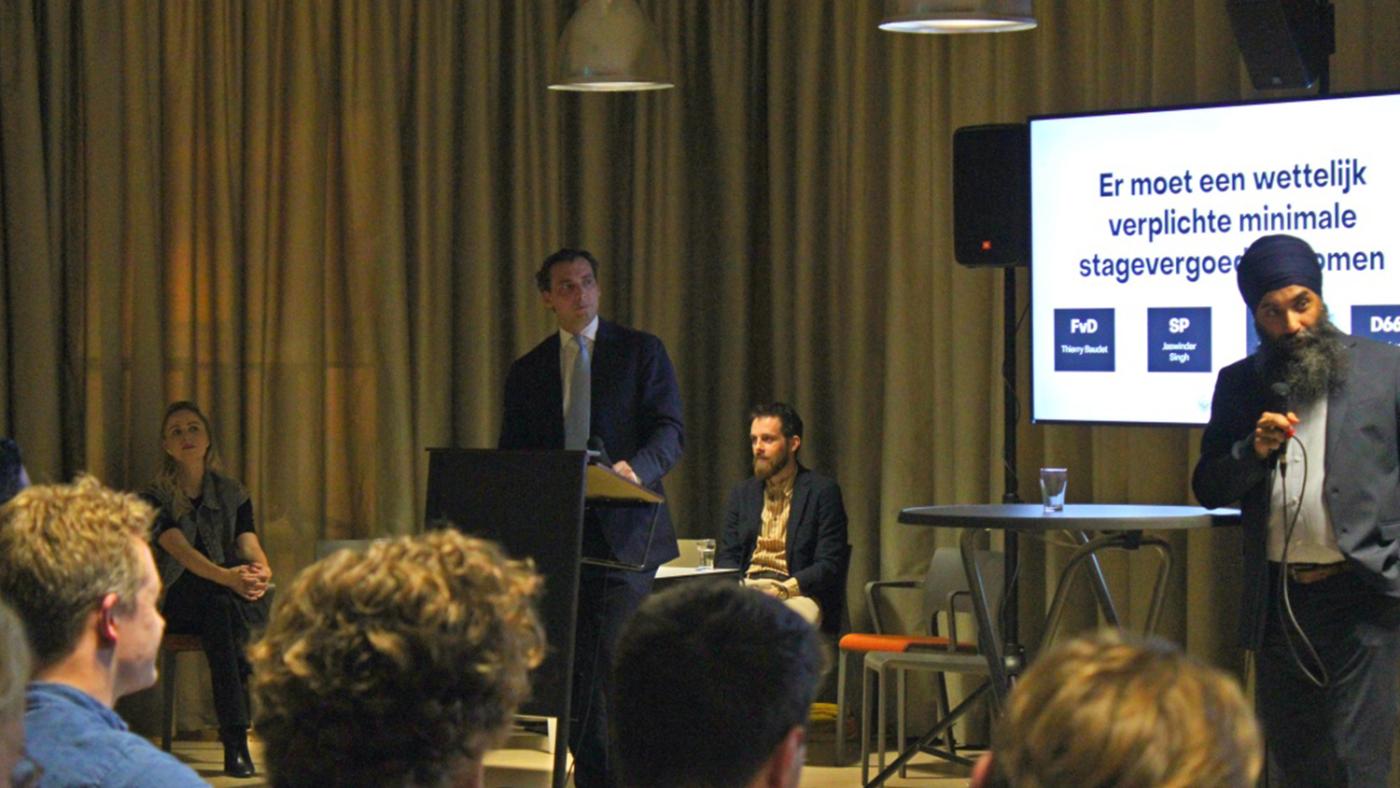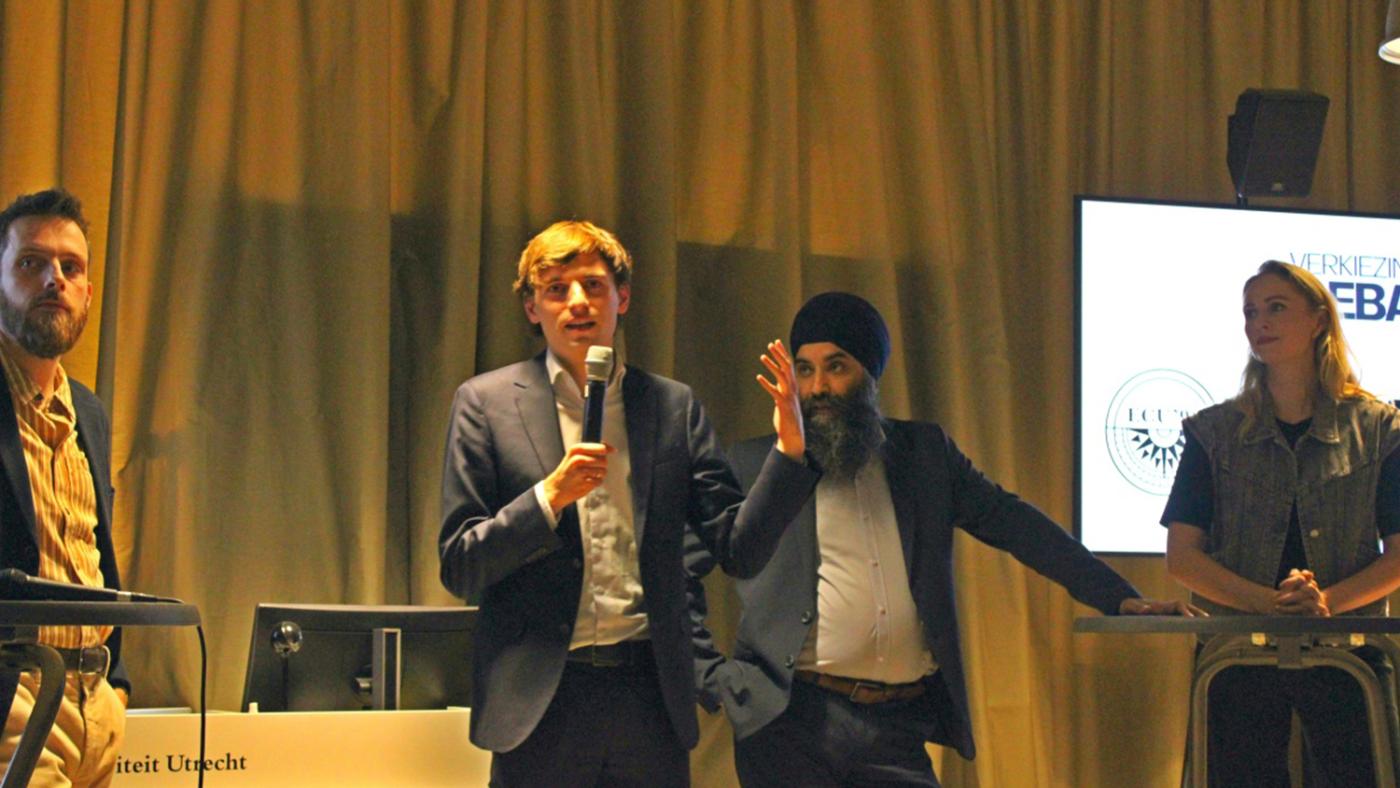Study associations of Law, Economics and Governance organise debate
‘Everything falls within the democratic constitutional state’

Baudet's presence is the elephant in the room. Twelve security guards – provided by the Dutch state – are present because Baudet is being threatened. In addition, the location was changed for his safety; a demonstration against his presence took place, and another in favour of his presence occurred as well. It is clear: tonight, democracy is in full swing. Several politicians present are appealing to the content, despite the background noise.
A protest is held in front of the Minneart building at Utrecht Science Park. Most participants are students who disagree with Baudet and his party, Forum for Democracy, and are critical of his presence at the debate. Student Ali finds it exciting to protest for this cause, especially considering he is a person of colour. "I am standing here as a natural reaction to his presence. I find it a frightening thought that he is here. And yes, I am also standing here because his ideas are fascist."
A few steps further, after the revolving doors at the entrance, Jonathan van Kerkhof, chair of the ECU study association, says that he finds all the events a little nerve-wrecking, "but I am resigned to the fact that we are well prepared tonight." At that moment, Baudet enters through a side entrance and is escorted upstairs by a group of security guards.

It's all about the content
The study associations ECU, Perikles and JSVU invited many parties, but not all were able or willing to attend. Only Thierry Baudet (FvD), Matthijs Buijs (CDA), Rick van der Zweth (GroenLinks-PvdA), Jaswinder Singh (SP), Queeny Rajkowski (VVD) and Stephan Neijenhuis (D66) are present.
Before the debate begins, a somewhat nervous atmosphere predominates in the room. The presence of security guards is uncomfortable, but people relax once moderator Justin Hermsen, from Perikles, thanks all the politicians for their attendance and announces that the debate can begin. Now, it's all about the content.
The politicians are presented with three propositions. The first is that there should be a legally binding minimum internship allowance. The second is that the national government should oblige university cities to build a fixed percentage of student housing in every new construction project. The final proposition is that the Netherlands should limit the influx of migrant workers, even if this leads to staff shortages in certain sectors. Each proposition is introduced with a brief overview of the current state of affairs, supported by figures.
CDA's turnaround
The politicians debate the issue of internship allowances for half an hour. D66, SP, and the CDA all agree that a mandatory allowance should be introduced. Only FvD opposes the idea. Baudet wants to steer the debate towards economic theory and the free market, while the rest keep it fairly concrete and talk about their own experiences with exhausted interns who are barely able to keep all the balls in the air. The general consensus among the three parties is that everyone should be paid for their work, and internships should be seen as work. CDA's change of heart is striking: in the House of Representatives, the Christian Democrats voted against the same proposition.
Despite the appeal to keep the debate substantive, Baudet makes comments such as “People should be sent back to Africa” and “this is the road to a totalitarian socialist utopia,” which lead to discontent among the audience, who murmur in response. What Africa has to do with an internship allowance remains unclear — but the statement fits with FvD's party programme. Given how close this debate is to the elections, his statements are not unexpected.
De Ravel
The content really comes into its own in the second proposition, regarding a fixed percentage of student housing in every new construction project in university cities. CDA and VVD are against it, while GroenLinks-PvdA and D66 are in favour. Things get interesting when the discussion turns to the vacant lot on Ravellaan.
According to Rick van der Zweth (GroenLinks-PvdA), currently a councillor for the PvdA and party leader in the municipality of Utrecht, the landowner has been waiting for a more favourable political climate for ten years. Matthijs Buijs (CDA) asks why PvdA is not intervening. "That is not possible under the regulations," is the answer.
A question from the audience puts Van der Zweth on the spot. "You talk about tackling vacancy, but in Utrecht, PvdA has evicted 180 students from Ravellaan this year, without any plans for anything else." The audience murmurs approvingly. Van der Zweth reports that the questioner is a VVD member of the municipal council. He must admit that it was an undesirable but necessary decision.

Strange comments
During the break, the audience is asked what they think of the debate so far. People say they disagree with Baudet talking over his fellow debaters. The moderator then seizes this opportunity to call the FvD leader into account. "Will you listen to me more carefully now?" Baudet: "We can vote on that." The audience votes overwhelmingly in favour. The moderator then says, "Democracy has spoken, so you really will have to listen more carefully now."
When asked why he talks over people, Baudet replies that it is his way of debating. "Taking turns to speak is not how I see a debate. It should be lively. I want to make the debate more vibrant." Baudet also says that he has come to Utrecht tonight because it is one of the two places where he is still allowed to debate. "Since the pandemic, I am no longer welcome in the mainstream media, and it is good for the campaign if I participate."
After the debate, the participants are invited to reflect on the evening. Both the representatives of VVD, Queeny Rajkowski, and SP, Jaswinder Singh, look back on it with satisfaction. According to Singh, the debate was enjoyable, with good arguments and substantive content. "Yes, Thierry makes some strange comments, but they are met with strong reactions."
Ideas may clash
For VVD member Rajkowski, an evening like this matters. "Let there be one place in the Netherlands where ideas can clash." What does she actually think of a debate in which a party labelled as extreme right-wing is present? "You can think whatever you want about that. I understand the organisation's decision to invite all political parties that are represented in the House of Representatives and have a chance of winning a seat." She remains unclear about whether and how to intervene in allegedly undemocratic situations.
For the moderator, Justin Hermsen, isolating FvD is not the way. "We can pretend these opinions don't exist and isolate them from our bubble. I would rather see these kinds of undemocratic ideas fought hard in the debate." Nevertheless, he says the study associations also debated extensively whether the far-right should be given a platform.
For Femke van Esch, vice-dean of the Faculty of Law, Economics and Governance, and a professor of Public Administration and Organisation Science, it is necessary to facilitate such debates. "The university is an institution, and it is our job to provide space for the plurality of ideas and opinions."
But what if those ideas and opinions actually undermine democracy? Fingers crossed and hope for the best? "We were well prepared and would have intervened if unethical ideas were expressed. But everything we saw and heard tonight falls within the framework of the democratic constitutional state."
Ik vind het zelf onprettig dan een persoon als Baudet een platform krijgt op de UU. De argumentatie vind ik bovendien nogal te kort schieten.
Ik zou het volgende ter overweging willen geven.
De gedachte dat de universiteit midden in de samenleving staat is een ideaal, geen realiteit. Een universiteit is bij uitstek een elite instituut voor modern wetenschappelijk onderzoek en onderwijs. Ik denk dat haar positie versterkt wordt door dit ruitelijk te onderkennen.
Dat alle meningen in de Nederlandse samenleving een representatie op de Universiteit zou moeten hebben , komt mij wonderlijk voor. Wordt dezelfde argumentatie gevolgd als het om Astrologie gaat? Of rassenleer?
Een universiteit schijnt mij primair geen plek waar op grond van vrijheid alles maar gezegd kan worden, maar een plek waar primair alles wat gezegd en gedacht kan worden, wordt getoetst op geldigheid en waarheid.
Uit de gedachte dat de universiteit een taak heeft 'om ruimte te geven aan de pluraliteit van ideeën en meningen' volgt niet dat alle ideeen en meningen ruimte dienen te krijgen.
En laten we nou alsjeblieft niet kritiekloos meegaan in de populistische kretelogie. Zo'n uitspraak als: Laat er nog één plek in Nederland zijn waar ideeën kunnen botsen.” is gewoon regelrechte nonsense: er zijn talloze plekken waarop ideeen kunnen botsen in Nederland. Het is misschien de mening van die VVD'er, maar het is een mening die kant noch wal raakt.
Tenslotte de suggestie dat door Baudet niet uit te nodigen, je zou ontkennen dat die meningen zouden bestaan. Dat is nogal een non-sequitur. Je zou voor het zelfde geld kunnen beargumenteren dat je hem niet uitnodigd om het niveau van het debat niet te zeer naar beneden te halen. Want nu moest er weer zo nodig een uitstapje naar Afrikaanse migranten gemaakt worden bij een onderwerp wat daar niets mee te maken heeft.
Niet alle posities zijn intellectueel gelijkwaardig.